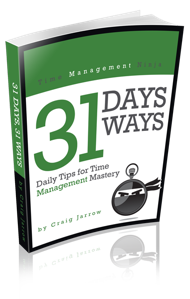
I often advise people to Choose Tools You’ll Use.
The follow-up question is, “Can you use the tools you have?”
In other words, are you proficient with them?
Or are you going to hurt someone with your productivity tools?
Can You Use The Tools?
When people are not proficient with the tools of their job, they end up as the victims of self-inflicted time management.
They create extra work and problems for themselves and others.
Recently, a colleague sent me a spreadsheet for review. I opened it in Excel and expected to make a few quick edits to it.
However, something was strange.
It took me a second. As I tried to click on the cells to change some text, nothing happened.
What was going on here? Was the sheet locked?
Then I double-clicked on one of the column labels.
Suddenly, it became apparent that all the text on the page was contained in individual text boxes that had been neatly arranged across the document. None of the text was contained in actual cells.
After a few words, that I will not repeat here, I walked down the hall to inquire about the document from my colleague.
The response…
“Did you know that you can join cells on there???
I just learned that!”
I was at a loss. I thought I was either in a Dilbert cartoon or being Punk’d.
Unfortunately, neither was true.
Hammering Your Thumb
It is assumed in this day and age that employees can use the technology and tools that we put in front of them.
However, this is not always the case. And it is a big obstacle to productivity in the workplace.
Consider the employee that doesn’t know how to use the company scheduling system and accidentally deletes weeks’ worth of upcoming schedules.
Or the project manager that ravages a project, wielding MS Project like a child with a chainsaw. It’s not pretty.
A few other proficiency examples:
– Not able to format a basic word-processing document.
– Powerpoint presentations filled with templates and Microsoft clip-art.
– Not knowing the basic laws of email.
– Not being able to turn off the ringer or sounds on a smartphone.
Do any of these sound like your workplace?
6 Ways to Learn Your Tools
Are you and your employees skilled with the tools needed to get the work done?
The good news is that it has never been easier to learn new skills.
Here are some quick tips on learning how to use the tools at your disposal:
- Take a Class – Many people stop learning after they leave school. Ironically, the best thing for many people’s career would be to go back and take a class. You can do this online, or at a local college or business.
- Get a Book – There is a book for anything these days. From creating that database to using your smartphone, you can be assured that someone has written a book on it.
- Google It – It sounds cliché, but via Google (or your favorite search engine) you can find blogs, niche sites, and other reference pages with instructions on the tool you are trying to use.
- YouTube – Video is one of the best ways to learn. People often overlook YouTube as a learning tool. Whatever the task you are trying to perform, there is probably a short video on YouTube that shows how to do it. (This is why it always amazes me when companies block YouTube.)
- Find an Expert – Instead of banging your head against the wall, (or the computer), find someone in your workplace who is an expert. A few minutes of expert advice can save you hours of extra work. And hopefully, you can return the favor in another area of knowledge.
- Use the Tool – Proficiency only comes with practice. The more you use a tool the better you get. When you learn how to use a new tool, make sure you keep using it to maintain your skills.
Know Your Tools
Make sure you know how to use the tools you have.
Especially the ones that you keep in your toolbox or that your company requires.
If you find that you don’t have the know how, then take action to learn a new skill.
The time you invest will pay itself back many times over down the road.
Question: What tool, technology, or skill do you need to learn?
 I am the author of Time Management Ninja and help individuals and companies reclaim their time to be more productive. As well, I am the author of the book
I am the author of Time Management Ninja and help individuals and companies reclaim their time to be more productive. As well, I am the author of the book 

Love it! Read it and you’ll join me. @TMNinja Are You Going To Hurt Someone With Your Productivity Tools?” http://t.co/6aAFA3bO
To me, it comes down to simple math that few people do.
If your knowledge about a tool shaves 5 minutes off your daily work – then you’ll end up saving nearly 20 hours of work at the end of a year. So even if you spent two full work days learning the tool, it was still a worthy investment of your time.
@Loren Pinilis Great example! Most people do not consider the long term benefits of saving time on simple tasks.
Wow. There are no words for your Dilbert moment other than that…wow. Hide all the sharp objects!!!
@wordsRimportant Yes… especially the staplers! 🙂
Craig,
This is a good topic!
Knowing your tools saves you from frustration.
However, you don’t have to be an expert of your tool right from the beginning. Sometimes even the simplest things can have a huge impact in your productivity (like learning a keyboard shortcut to commonly used functionality).
Cheers,
Timo